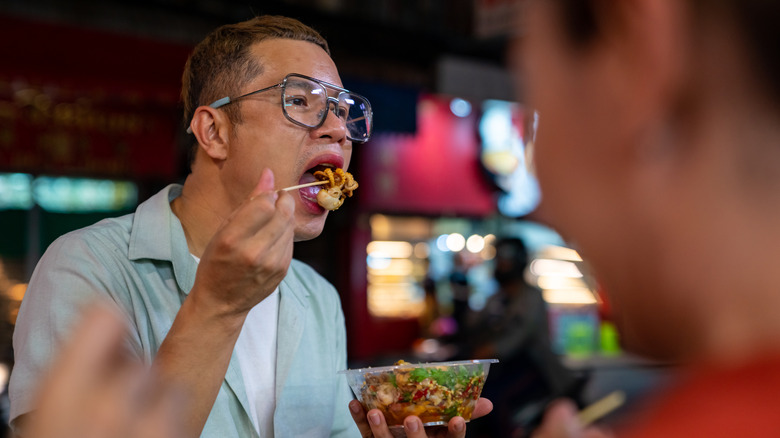The Personality Trait You Most Likely Have If You Love Spicy Food
Do you look for the hot sauce at the dinner table every time you're about to enjoy a meal? Order the extra spicy burger at the local burger spot, and your friends think your taste buds have died because you're able to munch on the meal without hating every moment of it? Chances are, you love spicy food.
People are quick to make assumptions about someone's preference for a certain type of food and their personality, and spicy cuisine isn't an exception. Some may have been called a rebel or perhaps even a masochist for their penchant for chili. Have you wondered if there was truth behind these ideas?
According to psychologist Dr. Jen Nash, a person's taste buds can tell us a lot about what kind of people they are. "Is it just a coincidence that words describing our major food tastes also express personality characteristics? Research would say no," she shared. So what does it really mean when you crave spicy food? What personality trait would people most likely have if they chose buffalo sauce over honey and garlic?
It might mean that you're a 'sensation seeker'
It turns out that the popular belief of what spicy food says about personality might actually hold some truth. These individuals might be thrill-seekers after all. Doctoral candidate at Pennsylvania State University Nadia Byrnes has the most quoted study related to the topic. She surveyed a group of 184 participants, all of whom were given 25 micrometers of capsaicin (the chemical found in chili peppers). The intensity of the spicy meal was increased gradually and the responses documented.
Byrnes shared with Science Direct, "Theoretically, we know that burn intensity and liking are linear related. The more irritating a compound or food gets, the less people should like it. But that's not always the case." Those who enjoyed the pepper's active component seemed to find pleasure in the pain, so to speak. The study, however, revealed different motivators in men and women. Men seemed to enjoy spicy food for extrinsic reasons like how it made them look to others (also known as "sensitivity to reward") and women for intrinsic purposes ("sensation seeking").
Food scientist Alissa Nolden thinks that enjoying spicy food is not so different from loving a rollercoaster ride. Some people love the adrenaline-pumping activity, while others don't — but what's actually happening to palates after consuming all that capsaicin?
Eating higher amounts of spicy food actually desensitizes your palate to spice
Have you ever wondered why some people's spice tolerance was much higher than others at the dinner table? While there are undoubtedly cultural, geographical, and familial reasons for choosing spicy food over others, consistently eating a lot of capsaicin actually desensitizes individuals to it over time, according to a study conducted by Nolden. "If we eat more of it, eat it more often, we need more of it to get the same burn response," she noted.
Spicy is a sensation more than a taste like salty, sweet, or sour. TRPV1, a receptor in our body, gets activated whenever we eat foods containing capsaicin. Cognitive neuroscientist Dr. Tamara Rosenbaum told BBC Reel that TRPV1 lets our body know when it is heating up. So when we eat something spicy, the TRPV1 alerts our brain that its temperature is rising, and this is probably why sweat droplets form around your temples or mouth when you bite into a jalapeño.
Identifying someone's traits is something that has fascinated humankind for years. It's probably why the world has developed Type A vs. Type B personalities and what they mean. Luckily for you, the only primary daily concern is figuring out how to burn your tongue every time you eat.


